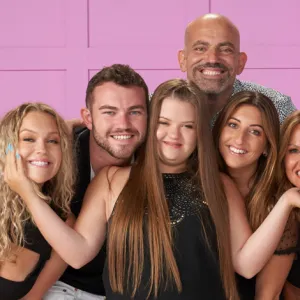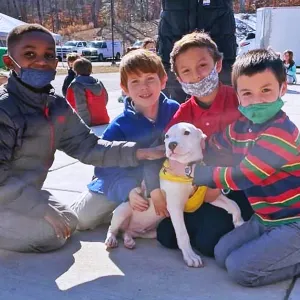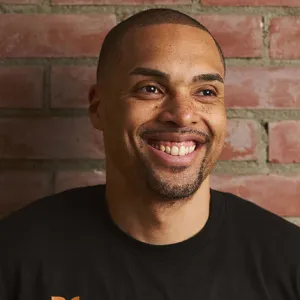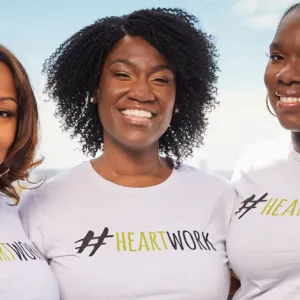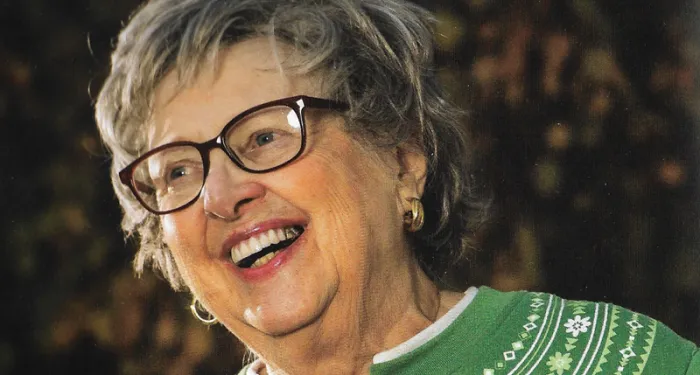
Florence Phillips
The Age-Defying Power of Mission
Here’s why the 88-year-old founder of ESL In-Home of Northern Nevada feels like she’s in her 40s.
People have searched for the fountain of youth throughout history.
Florence Phillips, an 88-year-old woman living in Reno, Nevada, may be the first person to successfully find it.
"I'm 88 years of age, and I still think I'm in my 40s," Phillips says. "I think that this program truly is what's keeping me breathing in and out every day."
The Mission: Help Families
"This program" is the ESL In-Home Program of Northern Nevada. It's a non-profit that teaches English language skills to families who've moved to the U.S. from around the globe — and does so at no cost to the families themselves.
More than 200 volunteers have helped 6,000 families in Reno and it's surrounding areas. The lessons come at no cost. For those families, it's about more than just learning English. The lessons teach them how to function in society.
"Parents are now helping their children with homework and other school activities, because they have the language to communicate with their children's teachers and medical personnel, without expensive interpreters," Phillips explains.
Phillips has a personal connection to the work which dates back to her childhood. Her parents moved to New York from Europe to escape the Holocaust. They didn't speak English, so as a child, Florence had to serve as an interpreter for her mother and father.
"What we're doing now is helping people attain the American dream," Phillips says." That's what my parents wanted."
Defying Age With Duty
Phillips led a successful career managing hotels before feeling a call to serve in her mid-50s. That led her to three tours in the Peace Corps. But the work for which she's the most well known — ESL In-Home — didn't start until she was 73 years old.
That's when Florence sat down to help one family living near her in Reno to learn English — and wound up discovering the mission that still drives her today.
"I don't know how you would explain it," Phillips says. "It's not a religious thing. It's just I know there's a power greater than myself. I know that today. That power has created this program. I am just the body, I guess, and the mind that has been given this mission."
And that mission has been gaining traction recently. Phillips has received awards from the Points of Light Institute, a CNN Heroes award, and in October 2019 she's to receive the Manhattan Society's Civil Society Award.
I've often cited the quote from Colin Powell: "Optimism is a force multiplier."
In this episode, you'll discover how Florence is herself a force multiplier.
FRANK BLAKE: Florence, welcome. It's great to have you on the show.
FLORENCE PHILLIPS: Thank you. I'm honored to be here.
FRANK BLAKE: Let's start here. You've helped a tremendous number of people learn to communicate better throughout your life. But did it start with your parents during your own childhood? Maybe you can tell us a little bit about that.
FLORENCE PHILLIPS: I'm grateful to my parents, who were immigrants from Europe. They came just before the Holocaust.
I was born in New York. I had problems conversing with my parents once I started school and learning English. They were emphasizing their goal to be an American, to become a citizen, and so they started English classes.
I know of the struggles and hardships that they went through. They practically came with the clothes on their back, coming into New York. But they had to pay tuition for a class. They had to travel to get to the class. Because they were hard workers, they sometimes had to miss classes. They had to pay for books. They had to arrange childcare for me.
FRANK BLAKE: Since your parents didn't speak English, I assume many of their interactions fell to you to translate.
FLORENCE PHILLIPS: Absolutely. I became an adult real fast. I had to translate mail that was coming in. There was no newspaper or radio or TV, of course, at that time, in their language, so they had to learn English in order to survive in the new life that they created for themselves.
Yes, it was frustrating for me. Many times, I would come home, and I didn't have the patience to help my parents with communications. I wanted to go out and play. I wanted to do my homework, which of course, they insisted on. Their whole goal for me was to be educated.
FRANK BLAKE: But that almost sounds like it might have steered you away from helping others with language issues, rather than taking you in that direction. It sounds like that would be frustrating and, as you say, prevent you from going out and having fun. What steered you in that direction?
FLORENCE PHILLIPS: Well, I think the Peace Corps had a lot to do with this new career of mine. They sent me to three foreign countries. Everywhere I went, they would pull on my arm and say, teacher, teacher, teach me English.
I started in Guatemala, where my Spanish was fluent, and then Jamaica, and then Kenya, East Africa, where I had to learn Swahili.
FRANK BLAKE: We're sort of taking it for granted that you went into the Peace Corps, but that was a decision you made in your 50s, correct?
FLORENCE PHILLIPS: Yes, I was 55 or 56 at the time.
FRANK BLAKE: What had you been doing previously?
FLORENCE PHILLIPS: I was a hotel manager. I was running three at the same time. After many years, probably when I was 54, I got burnt out. I wanted to do something else, but I didn't want a new career. I didn't want to learn something different, and I didn't want to have a 9:00 to 5:00.
All of a sudden, somebody mentioned going into the Peace Corps as a volunteer. I applied. I asked if they would take someone my age. I thought it was only for college graduates, recent college graduates. They said yes. They had a 75-year-old woman living in Guatemala, who, of course, eventually, when I got there, I met her.
Then I came home and was retired. They say go out and get a real job. So at 73, here I'm faced again with not wanting to learn something new, not wanting a 9:00 to 5:00. The message came to me; I could do right here where I live in my town what I did in foreign countries. That was to teach English.
Then I remembered my parents. My heavens, we had 22% non-English speaking people living in my town, and I knew why they weren't speaking English. I knew of their obstacles, lack of funds, lack of tuition, books, childcare, having two or three jobs, and not able to meet the schedules of the schools where English was being taught.
So I said, hey, that's my mission. Why teach in foreign countries when I can stay here in the US and be a Peace Corps volunteer right here, at least to have that project? Because the Peace Corps motto, which is, "If you've helped one person, you've done your job."
FRANK BLAKE: That's such a great motto. So, Florence, back to the decision that, again, you say so matter-of-factly to go three times into the Peace Corps. I assume it was a huge upheaval in your life. How did that come about?
FLORENCE PHILLIPS: Well, before I made an application with the Peace Corps, I wrote a journal. What is it that I want to do for the rest of my life? I'm in my early 50s. It came out that I wanted to travel.
However, I wasn't independently wealthy to just pick up and go to a foreign country and live. That's why the Peace Corps came to mind, because they do pay transportation. They pay a living allowance, et cetera.
FRANK BLAKE: It's a radical way to see the world.
FLORENCE PHILLIPS: Absolutely. I am adventurous, and I have been to many, many countries, except Antarctica. That's on my bucket list.
FRANK BLAKE: Well, there probably aren't so many people who need language skills in Antarctica. So what was it like to live there? Something must have clicked with that. What clicked?
FLORENCE PHILLIPS: I would have done it for the rest of my life.
The Peace Corps sent me as a small business advisor. Of course, there are no businesses there because there are no industries, but helping people learn English, teaching them how to distribute their vegetables, how to market their products to sell, to become entrepreneurs themselves. But without the language, they were held back.
I guess I consider myself an educator. I am helping people become citizens because, without the English language, they cannot do that. We have over 350 citizens now from the learners that have started my program, and it all started with learning English. They have advanced. Some of them are now enrolling in higher education. Many have started their own businesses, which was a problem for me as a child.
These parents are not helping their children with homework and other school activities, because they have the language to communicate now with their children's teachers and medical personnel, without expensive interpreters. They're slowly getting off social service programs.
FRANK BLAKE: What an amazing effect that you can have on an individual and on families in a community. Was there a moment when you knew that this was something you just had to do?
FLORENCE PHILLIPS: After I came back, I decided to become an AmeriCorps VISTA volunteer, because I needed to do something at the age of … What was I? 69, I think, when I returned from the Peace Corps. So I served five years as an AmeriCorps VISTA. Then they retire you and tell you to go out and get a real job. Well, at 73, I wasn't about to do that.
So I told my husband at the time I want to go back to the Peace Corps because I truly wanted to have that experience, the positiveness of people progressing in what I could teach them. But my husband waved his hand to me, and he said, "I'll miss you."
FRANK BLAKE: That's a defining moment.
FLORENCE PHILLIPS: Yeah. I wasn't about to leave him. So three months later, in February of 2004, the message came to me. It was like the light bulb lighting. I don't have to go anywhere. I could stay right here and have that as a mission.
I truly believed, when I was in the Peace Corps in each of the three countries, that I was a missionary, not a religious one, but I felt that I was a missionary.
So here in the United States, not being a missionary, but definitely getting the message that this is my mission, because there have been quite a few downfalls in the ESL In-Home program. Each time that I think it's leaving, it gets picked up somehow or other. It keeps going.
FRANK BLAKE: So what kind of downfalls did you face?
FLORENCE PHILLIPS: A lack of funds, number one, just the little things like office supplies and cartridges, et cetera, because we're a completely volunteer program.
We have, right now, 205 volunteers teaching over 400 learners, and they're unpaid. They give of their energy, their gas, their time to help a person achieve the American dream.
That's what my parents wanted, and that's what we're doing now, having people attain that American dream.
FRANK BLAKE: How did you find your first volunteers?
FLORENCE PHILLIPS: I went to an organization here that was called Hispanic Services, and I asked them for one of their clients who does not speak English but who wants to speak English. So they gave me this woman's name, address, living just a few blocks from where I was living. So I made an appointment with her.
When I knocked on her door the day and time I told her I would be there, she opened the door, and there were five other people sitting at the table. She had told neighbors and friends that this woman is coming, and she's not going to charge me, and she's going to teach me right here in my home.
So I found that the five people were all on different levels, because some of them had jobs. The men were working, and they picked up some street language, of course. There was one who knew how to write her name.
There was one who was completely illiterate in her own language. The others maybe had third-grade schooling. It was difficult for me to teach all of them. So what I did was I recruited two of my friends to also become tutors. I created the curriculum of how to teach English as a second language, so there were three of us at the time helping this one family.
FRANK BLAKE: Just listening to you talk about this, it leads me to both optimism, which you clearly have in seeing through the downfalls and seeing through the tough times, but also the energy level.
What gives you the energy to set up a new program, find volunteers, develop curricula? What do you think is that force behind you?
FLORENCE PHILLIPS: It's the mission that was given to me. I don't know how you would explain it.
It's not a religious thing. It's just I know there's a power greater than myself. I know that today. That power has created this program. I am just the body, I guess, and the mind that has been given this mission.
I'm 88 years of age, and I still think I'm in my 40s. I think that this program truly is what's keeping me breathing in and out every day.
FRANK BLAKE: Are there examples of students who the impact just gives you that fuel every day?
FLORENCE PHILLIPS: Absolutely. I get very emotional when I get a call, like, say, this one parent said, "I had a conversation with her teacher, and she understood me, and I understood her."
Or the ones that started their own business. I have learners that are now house cleaners in their own business. One became a CNA. Some are attending community colleges for higher education.
I had a 65-year-old man. All he wanted to do was learn how to write his name. So after a while, the tutor that I found for him called me and said, "My student just finished writing his name for the 20th time today, and he looked at his name, and he had tears in his eyes while he was telling me, 'That is me.'"
Which, of course, gives me tears in my eyes. I mean, that's so fabulous.
FRANK BLAKE: So I understand that you have a waiting list of more than 900 people. Do you plan to expand the program in the future?
FLORENCE PHILLIPS: Yes, because of CNN and their exposure internationally, I have received many requests from different states, how do I start your program where I live? Because the immigrants are everywhere, not only in Nevada.
I have also received emails from people outside of the United States, different countries wanting me to now help them via Skype. I have other requests from China, Beijing, China, Japan, Korea. They're all coming through, and I am blessed.
I truly am blessed, because there are people right here in our own country that are anxious to help. I have tutors that only want to help refugees. We have 13 families here in Reno that are learning English. We want to expand, but I need funds.
FRANK BLAKE: So, Florence, what piece of advice has stuck with you throughout your life?
FLORENCE PHILLIPS: Do what you feel is right to do.
FRANK BLAKE: Is that something from your parents, something that you got from someone along the way, something that you developed on your own?
FLORENCE PHILLIPS: I think it's from my parents, my father especially. You could do anything you want to do. This is the land of opportunity.
FRANK BLAKE: That's terrific. I've read that you said that you want to retire at the age of 94. Is that right? Why 94?
FLORENCE PHILLIPS: Well, my husband and I were married at 64. We met late in life, married at 64, and my husband, the humorist, changed the Beatles "When we're 64" to 94. He was very productive in projects, as well. He had his projects, and I had mine.
Then we had mutual together projects. But we decided, at 94, we were going to retire from all our projects, and then do our bucket list.
FRANK BLAKE: One final question. So you teach a lot of people. You've interacted with a lot of people. If you could teach people, English speakers and non-English speakers alike, one lesson, what would it be?
FLORENCE PHILLIPS: Oh, my. Well, the beginners, the first thing I teach them is how to identify themselves.
When I travel to foreign countries, I want to tell people my name and where I come from, why I'm here, et cetera. So that's the first thing is to identify yourself, know your name, your address, your phone number if you want to give it, where you came from, how long you've been here, why you're here, and what do you want to do.
FRANK BLAKE: That's very straightforward and profound at the same time. That is excellent.
Well, thank you so much. What an amazing impact you've had. You say it very modestly, but you've done some amazingly crazy good things for others.
You're living a life that we should all celebrate and recognize, so thank you very much.
FLORENCE PHILLIPS: Thank you, thank you.

